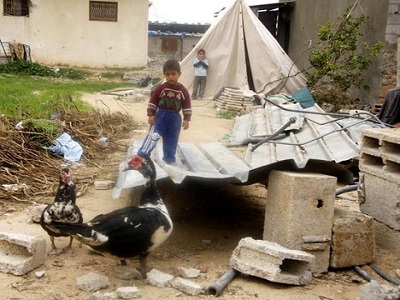Gaza Experiment: Mere Words Will Not Help Solve Gaza Crisis

Gaza has never been truly free from blockade. (IRIN)
By Ramzy Baroud – Special to Gulf News
The fifth anniversary of the Israeli siege on Gaza was commemorated on June 14 with a barrage of statements, urging Israel to end the blockade and allow Gazans long-denied humanitarian assistance, freedom of movement and access to trade routes. The punitive siege has turned into yet another protracted crisis, brazenly imposed by Israel and widely accepted by the international community.
“For over five years in Gaza, more than 1.6 million people have been under blockade in violation of international law,” read a joint statement by more than 50 international organizations. “More than half of these people are children. We the undersigned say with one voice: ‘End the blockade now’”. Signatories of the statement included Save the Children, Oxfam, the World Health Organization, Amnesty International and Médecins du Monde.
The statement followed a strong censure of the siege by the UN Under-Secretary-General for Humanitarian Affairs, Valerie Amos. She has decried what she described as “collective punishment of all those living in Gaza and …a denial of basic human rights in contravention of international law.” She demanded that the “blockade be lifted immediately, so that essential services and infrastructure can be maintained.”
Condemning Israeli rights violations in Palestine by leading human rights and humanitarian organizations is nothing new. Unfortunately, such calls are rarely followed by any organized political campaign. Western governments are least concerned by the ongoing drama. Historically, they have employed a selective policy of outrage whenever human rights are violated. Worse, in many cases, Western powers have taken an active role in allowing continued Israeli subjugation of Palestinians.
Israel often brushes aside any criticism of its actions in Gaza and the rest of the Occupied Territories. When compelled to respond, it conveniently refers to Hamas, rockets and terrorism. Mark Regev, spokesperson for Israeli Prime Minister, Benjamin Netanyahu, turned the siege into a mere technicality, invited by Palestinian unruliness when he claimed that “all cargo going into Gaza must be checked because Gaza is controlled by Hamas,” But his claims, like those made by the Israeli political establishment, are fraudulent.
What is missing in the siege analysis is the fact that Israel’s hostile attitude towards Gaza dates back decades before Hamas’ formation in 1987. Most attempts at documenting that bit of history fails to note that Gaza has never been truly free from blockade. Even during periods of apparent peace and calm — for example, following the signing of the Oslo Accords in 1993 and the subsequent establishment of the Palestinian National Authority — Gaza still endured. That perpetual siege manifested itself in various forms, but always ensured that an independent Gazan economy remained unsustainable and that the Strip’s inhabitants remained disproportionately reliant on humanitarian aid.
Nevertheless, the state of uninterrupted siege somehow manages to deteriorate. The chronically impoverished and overcrowded Strip (approximately 365 square kilometers, holding a growing population of 1.6 million) has been used as grounds for a crude Israeli experiment, the outcome of which was often applied to Palestinian areas in the rest of the Occupied Territories. Foremost among these experiments was former Israeli prime minister Ariel Sharon’s destruction of Palestinian refugee camps in central and northern Gaza in the early 1970s. The inhabitants of these camps were relocated en masse to other parts of Gaza in order to create a sense of collective psychological dislocation amongst the resisting refugees. Hundreds of Palestinians were literary thrown in the Sinai desert to “set an example”.
Considering Israel’s ever-aggressive attitude towards Palestinians in Gaza, it makes little sense for the crisis to be consistently referred to as a humanitarian one. Palestinians are not a collective experiment, despite Israeli assertions to the contrary. This policy was articulated by Israeli politician Dov Weissglass, a former close associate of Ariel Sharon, when he said: “The idea is to put the Palestinians on a diet, but not to make them die of hunger”. That collective “diet” was part of a larger policy that accompanied the Israeli deployment — termed “disengagement” — from Gaza in 2005. “The disengagement is actually formaldehyde. It supplies the amount of formaldehyde that’s necessary so that there will not be a political process with the Palestinians.”
The statements above were quoted in Israeli daily Haaretz (August 10, 2004). They make it clear that the plans to place Gaza under siege came well before Hamas’ victory in the Palestinian legislative council elections in 2006 and its subsequent violent clashes with rival Fatah. They also long preceded the capture of Israeli solider Gilad Shalit.
Still, the policy of isolation received a huge boost in September 2007, when Israel declared Gaza a “hostile entity”, cutting more supplies and tightening the siege further. Then, as in 2005, Israeli government spokesmen inundated the media with claims that Israel was no longer responsible for the fate of Gaza. A year or so later, it carried out a one-sided war that killed and wounded thousands of Palestinians.
Despite all evidence that the Israeli siege on Gaza is part of a well-orchestrated political and military campaign, many insist on seeing it as an issue concerning household supplies, gasoline and foodstuff. Indeed, with 31 per cent unemployment, and more than 75 per cent of the population reliant on international aid, Gaza is suffering a humanitarian crisis. But that crisis can never be truly appreciated without a thorough understanding of the political underpinnings of Israel’s ultimate objectives in Gaza and the rest of Palestine. The Gaza siege is an Israeli political decision that must be addressed and resisted as such. It should never be allowed to exist as yet another status quo, generating a few words of censure but no meaningful action.
– Ramzy Baroud is an internationally-syndicated columnist and the editor of PalestineChronicle.com. His latest book is My Father Was a Freedom Fighter: Gaza’s Untold Story. (This article originally appeared in Gulf News – http://gulfnews.com)










































0 Comments